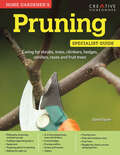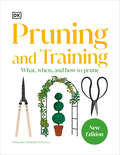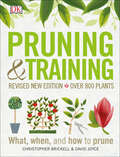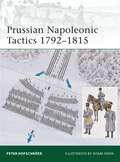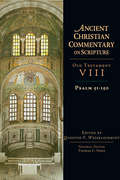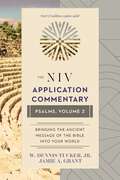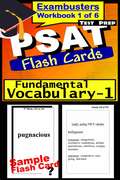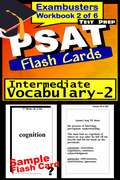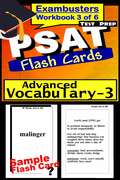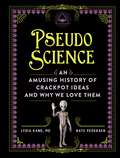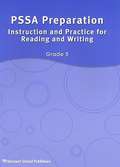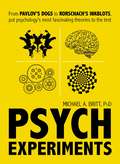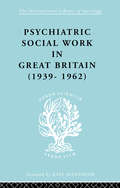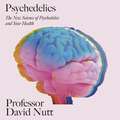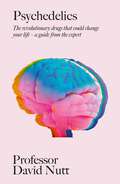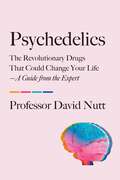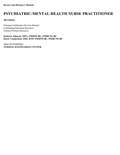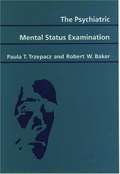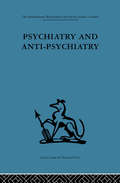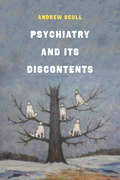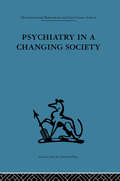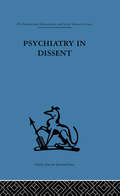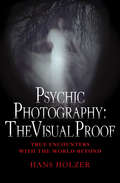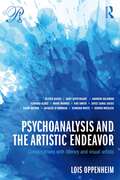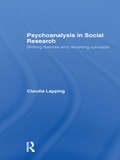- Table View
- List View
Pruning: Caring for shrubs, trees, climbers, hedges, conifers, roses and fruit trees (Home Gardener's)
by David SquireIn order to be a successful gardener you have to know how to prune—whether to improve growth, increase fruiting qualities or to enable the plant to grow in space-restricted areas or cold environments. This practical book provides advice on pruning garden plants, from infancy to maturity. Included is detailed advice on renovating neglected plants, from shrubs and climbers to fruit trees and bushes. There is also a fun element, with instructions for creating topiary in the garden.
Pruning and Training: What, When, and How to Prune
by DKCut with confidence: know when and how to prune your trees and plants with this complete guide from the experts.Keep your garden in top shape with this guide to pruning over 800 plants, shrubs, fruit bushes, ornamental trees, and climbing plants. Clear illustrations and step-by-step photographs guide you through some of the simplest – and more complicated – approaches to keeping your plants in good order.Knowing how to prune and shape plants correctly will help you achieve the best displays of flowers, produce bumper crops of fruit, and help your plants remain disease-free. A practical A-Z approach, organized by plant type, displays detailed information in an easy-to-use format, as well as guides for more specialized techniques. Whether pinch or renovation pruning, or pollaring and topiary, this book has it all.
Pruning and Training, Revised New Edition: What, When, and How to Prune
by DKFeaturing more than 800 plants and step-by-step instructions to pruning and training hundreds of trees, shrubs, and climbing plants, this comprehensive guide is freshly redesigned to help cultivate your perfect garden.With chapters on everything from rosebushes to peach trees, Pruning and Training has advice for every garden and gardener. Using a practical A–Z approach, organized by plant type, information is displayed in an easy-to-follow format and annotated illustrations that carefully guides readers on specialized techniques for each plant type, including coppicing and pollarding for trees and pinch pruning for shrubs.Learn the basic training techniques for climbers and see how to maintain ornamental shrubs in your garden, including grasses for your topiary or hedges and bamboo. Train jasmine to climb a wall, learn where to prune a rose, and increase your fruit tree's yield.Pruning and Training is the essential guide to pruning and training your garden plants with confidence.
Prussian Napoleonic Tactics 1792-1815
by Adam Hook Peter HofschröerWritten by an expert on the Prussian army of the Napoleonic era, this is a fascinating insight into the 18th-century evolution of the Prussian forces into the war-winning troops of the final battles against Napoleon. Using contemporary materials including drill regulations, instructions, staff and regimental histories and after-action reports, this book provides a compelling history of Prussian tactics from 1792 until 1815. It includes studies of the professional Prussian army during the Revolutionary Wars and the mass mobilization of a conscript army that fought during the Wars of Liberation and Waterloo. Following on from the success of Osprey's other Elite Tactics volumes, this is a must-have for serious students of Napoleonic warfare, armchair generals, and wargamers alike.
Psalms 51-150 (Ancient Christian Commentary on Scripture #Ot Volume 8)
by Quentin F. WesselschmidtThe Psalms have long served a vital role in the individual and corporate lives of Christians, expressing the full range of human emotions, including some that we are ashamed to admit. The Psalms reverberate with joy, groan in pain, whimper with sadness, grumble in disappointment and rage with anger. The church fathers employed the Psalms widely. In liturgy they used them both as hymns and as Scripture readings. Within them they found pointers to Jesus both as Son of God and as Messiah. They also employed the Psalms widely as support for other New Testament teachings, as counsel on morals and as forms for prayer. Especially noteworthy was their use of Psalms in the great doctrinal controversies. The Psalms were used to oppose subordinationism, modalism, Arianism, Apollinarianism, Nestorianism, Eutychianism and Monophysitism, among others. More than fifty church fathers are cited here from Ambrose to Zephyrinus. From the British Isles, Gaul and the Iberian Peninsula, we find Hilary of Poitiers, Prudentius, John Cassian, Valerian of Cimiez, Salvian the Presbyter, Caesarius of Arles, Martin of Bruga, Braulio of Saragossa and Bede. From Rome and Italy, we find Clement, Justin Martyr, Callistus, Hippolytus, Novatian, Rufinus, Maximus of Turin, Peter Chrysologus, Leo the Great, Cassiodorus and Gregory the Great. Carthage and North Africa are represented by Tertullian, Cyprian, Augustine and Fulgentius. Fathers from Alexandria and Egypt include Clement, Origen, Dionysius, Pachomius, Athanasius, Cyril and Poemen. Constantinople and Asia Minor supply the Great Cappadocians--Basil the Great and the two Gregorys, from Nazianzus and Nyssa--plus Evagrius of Pontus and Nicetas of Remesiana. From Antioch and Syria we find Ephrem, John Chrysostom, Theodore of Mopsuestia, Theodoret of Cyr, Philoxenus of Mabbug, Sahdona and John of Damascus. Finally, Jerusalem, Palestine and Mesopotamia are represented by Eusebius of Caesarea, Aphrahat, Cyril, Jacob of Sarug, Jerome and Isaac of Nineveh. Readers of these selections, some appearing in English for the first time, will glean from a rich treasury of deep devotion and profound theological reflection.
Psalms, Volume 2 (The NIV Application Commentary)
by null W. Dennis Tucker, Jr. null Jamie A. GrantThe NIV Application Commentary helps you communicate and apply biblical text effectively in today's context.To bring the ancient messages of the Bible into today's world, each passage is treated in three sections:Original Meaning. Concise exegesis to help readers understand the original meaning of the biblical text in its historical, literary, and cultural context.Bridging Contexts. A bridge between the world of the Bible and the world of today, built by discerning what is timeless in the timely pages of the Bible.Contemporary Significance. This section identifies comparable situations to those faced in the Bible and explores relevant application of the biblical messages. The author alerts the readers of problems they may encounter when seeking to apply the passage and helps them think through the issues involved.This unique, award-winning commentary is the ideal resource for today's preachers, teachers, and serious students of the Bible, giving them the tools, ideas, and insights they need to communicate God's Word with the same powerful impact it had when it was first written.
PSAT Test Prep Flash Cards: Fundamental Vocabulary - 1 (Exambusters PSAT Workbook #1 of 6)
by Ace Inc.<P><P><i>Advisory: Bookshare has learned that this book offers only partial accessibility. We have kept it in the collection because it is useful for some of our members. Benetech is actively working on projects to improve accessibility issues such as these.</i><P><P> 300 basic words every high school freshman should know. Includes part of speech, pronunciation, succinct, easy-to-remember definition, and common synonyms and antonyms.<P><P> <P>EXAMBUSTERS PSAT Prep Workbooks provide comprehensive, fundamental PSAT review--one fact at a time--to prepare students to take practice PSAT tests. Each PSAT study guide focuses on one specific subject area covered on the PSAT exam. From 300 to 600 questions and answers, each volume in the PSAT series is a quick and easy, focused read. Reviewing PSAT flash cards is the first step toward more confident PSAT preparation and ultimately, higher PSAT exam scores!
PSAT Test Prep Flash Cards: Intermediate Vocabulary 2 (Exambusters PSAT Workbook #2 of 6)
by Ace Inc.<P><P><i>Advisory: Bookshare has learned that this book offers only partial accessibility. We have kept it in the collection because it is useful for some of our members. Benetech is actively working on projects to improve accessibility issues such as these.</i><P><P> 500 frequently tested PSAT/NMSQT words every high school student should know. Perfect for anyone who wants to enrich their vocabulary! Improve your reading comprehension and conversation.<P><P> Includes sample sentence, part of speech, pronunciation, succinct, easy-to-remember definition, and common synonyms and antonyms. <P>EXAMBUSTERS PSAT Prep Workbooks provide comprehensive, fundamental PSAT review--one fact at a time--to prepare students to take practice PSAT tests. Each PSAT study guide focuses on one specific subject area covered on the PSAT exam. From 300 to 600 questions and answers, each volume in the PSAT series is a quick and easy, focused read. Reviewing PSAT flash cards is the first step toward more confident PSAT preparation and ultimately, higher PSAT exam scores!
PSAT Test Prep Flash Cards: Advanced Vocabulary (Exambusters PSAT Workbook #3)
by Ace Inc.<P><P><i>Advisory: Bookshare has learned that this book offers only partial accessibility. We have kept it in the collection because it is useful for some of our members. Benetech is actively working on projects to improve accessibility issues such as these.</i><P><P> 350 frequently tested PSAT/NMSQT words every college freshman should know. Perfect for anyone who wants to enrich their vocabulary! Improve your reading comprehension and conversation.<P><P> Includes sample sentence, part of speech, pronunciation, succinct, easy-to-remember definition, and common synonyms and antonyms. <P>EXAMBUSTERS PSAT Prep Workbooks provide comprehensive, fundamental PSAT review--one fact at a time--to prepare students to take practice PSAT tests. Each PSAT study guide focuses on one specific subject area covered on the PSAT exam. From 300 to 600 questions and answers, each volume in the PSAT series is a quick and easy, focused read. Reviewing PSAT flash cards is the first step toward more confident PSAT preparation and ultimately, higher PSAT exam scores!
Pseudoscience: An Amusing History of Crackpot Ideas and Why We Love Them
by Lydia Kang Nate PedersenFrom the authors of Quackery, a visual and narrative history of popular ideas, phenomena, and widely held beliefs disproven by science. From the easily disproved to the wildly speculative, to straight-up hucksterism, Pseudoscience is a romp through much more than bad science—it&’s a light-hearted look into why we insist on believing in things such as Big Foot, astrology, and the existence of aliens. Did you know, for example, that you can tell a person&’s future by touching their butt? Rumpology. It&’s a thing, but not really. Or that Stanley Kubrick made a fake moon landing film for the US government? Except he didn&’t. Or that spontaneous human combustion is real? It ain&’t, but it can be explained scientifically. Pseudoscience is a wild mix of history, pop culture, and good old fashioned science–that not just entertains, but sheds a little light on why we all love to believe in things we know aren't true.
PSSA Preparation Instruction and Practice for Reading and Writing (Grade #5)
by Editors at the Harcourt School PublishersThis test prep booklet will give you practice in taking the Pennsylvania System of School Assessment test that has 3 types of questions : multiple choice, short answer, and extended response.
Psych Experiments: From Pavlov's dogs to Rorschach's inkblots, put psychology's most fascinating studies to the test
by Michael A BrittPsychology's most famous theories--played out in real life! Forget the labs and lecture halls. You can conduct your very own psych experiments at home! Famous psychological experiments--from Freud's ego to the Skinner box--have changed the way science views human behavior. But how do these tests really work? In Psych Experiments, you'll learn how to test out these theories and experiments for yourself...no psychology degree required! Guided by Michael A. Britt, creator of popular podcast The Psych Files, you can conduct your own experiments when browsing your favorite websites (to test the "curiosity effect"), in restaurants (learning how to increase your tips), when presented with advertisements (you'd be surprised how much you're influenced by the color red), and even right on your smartphone (and why you panic when you can't find it). You'll even figure out how contagious yawning works! With this compulsively readable little book, you won't just read about the history of psychology--you'll live it!
Psych Soc Work Gt Brit Ils 264: 1939-1962 (International Library of Sociology #3)
by Noel TimmsFirst published in 1998. Routledge is an imprint of Taylor & Francis, an informa company.
Psychedelics: The revolutionary drugs that could change your life – a guide from the expert
by Professor David NuttThe definitive guide to psychedelics, science and our health by a world-renowned, leading authority, Professor David Nutt.We are on the cusp of a major revolution in psychiatric medicine and neuroscience. After fifty years of prohibition, criminalisation and fear, science is finally showing us that psychedelics are not dangerous or harmful. Instead, when used according to tested, safe and ethical guidelines, they are our most powerful newest treatment of mental health conditions, from depression, PTSD, and OCD to disordered eating and even addiction and chronic pain.Professor David Nutt, one of the world's leading Neuropsychopharmacologists, has spent 15 years researching this field and it is his most significant body of work to date. In 2018, he co-founded the first academic psychedelic research centre - underpinned by his mission to provide evidence-based information for people everywhere. It revived interest in the understanding and use of this drug in its many forms, including MDMA, ayahuasca, magic mushrooms, LSD and ketamine. The results of this have been nothing short of ground-breaking for the future categorisation of drugs, but also for what we now know about brain mechanisms and our consciousness.At a time where there is an enormous amount of noise around the benefits of psychedelics, this book contains the knowledge you need to know about a drug that is about to go mainstream, free from the hot air, direct from the expert.Are you ready to change your mind?(P) 2023 Hodder & Stoughton Limited
Psychedelics: The revolutionary drugs that could change your life – a guide from the expert
by Professor David NuttWe are on the cusp of a major revolution in psychiatric medicine and neuroscience. After fifty years of prohibition, criminalisation and fear, science is finally showing us that psychedelics are not dangerous or harmful. Instead, when used according to tested, safe and ethical guidelines, they are our most powerful newest treatment of mental health conditions, from depression, PTSD, and OCD to disordered eating and even addiction and chronic pain.Professor David Nutt, one of the world's leading Neuropsychopharmacologists, has spent 15 years researching this field and it is his most significant body of work to date. In 2018, he co-founded the first academic psychedelic research centre - underpinned by his mission to provide evidence-based information for people everywhere. It revived interest in the understanding and use of this drug in its many forms, including MDMA, ayahuasca, magic mushrooms, LSD and ketamine. The results of this have been nothing short of ground-breaking for the future categorisation of drugs, but also for what we now know about brain mechanisms and our consciousness.At a time where there is an enormous amount of noise around the benefits of psychedelics, this book contains the knowledge you need to know about a drug that is about to go mainstream, free from the hot air, direct from the expert.Are you ready to change your mind?
Psychedelics: The Revolutionary Drugs That Could Change Your Life—A Guide from the Expert
by Professor David NuttThe definitive guide to the science of psychedelics—"the perfect intro for anyone curious about psychedelics and MDMA&” (Ethan Nadelmann, founder and former executive director, Drug Policy Alliance)--and how they can impact our health by world-renowned, leading authority Professor David Nutt. We are on the cusp of a major revolution in psychiatric medicine and neuroscience. After fifty years of prohibition, criminalization and fear, science is finally showing us that psychedelics are not dangerous or harmful. Instead, when used according to tested, safe and ethical guidelines, they are our most powerful newest treatment of mental health conditions, from depression, PTSD, and OCD to disordered eating and even addiction and chronic pain. Professor David Nutt, one of the world's leading Neuropsychopharmacologists, has spent 15 years researching this field and it is his most significant body of work to date. In 2018, he co-founded the first academic psychedelic research center - underpinned by his mission to provide evidence-based information for people everywhere. It revived interest in the understanding and use of this drug in its many forms, including MDMA, ayahuasca, magic mushrooms, LSD and ketamine. The results of this have been nothing short of ground-breaking for the future categorization of drugs, but also for what we now know about brain mechanisms and our consciousness. At a time where there is an enormous amount of noise around the benefits of psychedelics, this book contains the knowledge you need to know about a drug that is about to go mainstream, free from the hot air, direct from the expert. Are you ready to change your mind?
Psychiatric-Mental Health Nurse Practitioner Review and Resource Manual
by Kathryn Johnson Dawn VanderhoefWritten by experts in psychiatric-mental health nurse practitioner practice, this book provides a clinical reference tool and certification examination preparation. This manual helps readers enhance critical thinking skills and identify strengths and weaknesses.
The Psychiatric Mental Status Examination
by Paula T. Trzepacz Robert W. BakerThis comprehensive text on the Mental Status Examination (MSE)should fill a void in the teaching literature and be useful to both students first learning about the MSE, and seasoned clinicians seeking an advanced reference.
Psychiatry and Anti-Psychiatry
by David CooperTavistock Press was established as a co-operative venture between the Tavistock Institute and Routledge & Kegan Paul (RKP) in the 1950s to produce a series of major contributions across the social sciences. This volume is part of a 2001 reissue of a selection of those important works which have since gone out of print, or are difficult to locate. Published by Routledge, 112 volumes in total are being brought together under the name The International Behavioural and Social Sciences Library: Classics from the Tavistock Press. Reproduced here in facsimile, this volume was originally published in 1967 and is available individually. The collection is also available in a number of themed mini-sets of between 5 and 13 volumes, or as a complete collection.
Psychiatry and Its Discontents
by Andrew ScullWritten by one of the world’s most distinguished historians of psychiatry, Psychiatry and Its Discontents provides a wide-ranging and critical perspective on the profession that dominates the treatment of mental illness. Andrew Scull traces the rise of the field, the midcentury hegemony of psychoanalytic methods, and the paradigm’s decline with the ascendance of biological and pharmaceutical approaches to mental illness. The book’s historical sweep is broad, ranging from the age of the asylum to the rise of psychopharmacology and the dubious triumphs of “community care.” The essays in Psychiatry and Its Discontents provide a vivid and compelling portrait of the recurring crises of legitimacy experienced by “mad-doctors,” as psychiatrists were once called, and illustrates the impact of psychiatry’s ideas and interventions on the lives of those afflicted with mental illness.
Psychiatry in a Changing Society
by S H Foulkes G Stewart PrinceTavistock Press was established as a co-operative venture between the Tavistock Institute and Routledge & Kegan Paul (RKP) in the 1950s to produce a series of major contributions across the social sciences. This volume is part of a 2001 reissue of a selection of those important works which have since gone out of print, or are difficult to locate. Published by Routledge, 112 volumes in total are being brought together under the name The International Behavioural and Social Sciences Library: Classics from the Tavistock Press. Reproduced here in facsimile, this volume was originally published in 1969 and is available individually. The collection is also available in a number of themed mini-sets of between 5 and 13 volumes, or as a complete collection.
Psychiatry in Dissent: Controversial issues in thought and practice second edition
by Anthony ClareTavistock Press was established as a co-operative venture between the Tavistock Institute and Routledge & Kegan Paul (RKP) in the 1950s to produce a series of major contributions across the social sciences. This volume is part of a 2001 reissue of a selection of those important works which have since gone out of print, or are difficult to locate. Published by Routledge, 112 volumes in total are being brought together under the name The International Behavioural and Social Sciences Library: Classics from the Tavistock Press. Reproduced here in facsimile, this volume was originally published in 1980 and is available individually. The collection is also available in a number of themed mini-sets of between 5 and 13 volumes, or as a complete collection.
Psychic Photography: The Visual Proof (True Encounters with the World Beyond #1)
by Hans HolzerProfessor Hans Holzer carefully examines historic photographic evidence of ghosts and paranormal activity, explaining which images contain convincing proof and which may be trickeryFor more than a century, psychic researchers have amassed a body of photographic evidence of the afterlife. Indeed, according to professor Hans Holzer, photography gives us one of the greatest tools in documenting souls that continue to exist among us after death. Here Holzer looks at the evidence of ghosts revealing themselves to us on film, and shares examples of psychic photographs, many of which were taken during séances.
Psychoanalysis and the Artistic Endeavor: Conversations with literary and visual artists (Psychoanalysis in a New Key Book Series)
by Lois OppenheimPsychoanalysis and the Artistic Endeavor offers an intriguing window onto the creative thinking of several well-known and highly creative individuals. Internationally renowned writers, painters, choreographers, and others converse with the author about their work and how it has been informed by their life experience. Creative process frames the discussions, but the topics explored are wide-ranging and the interrelation of the personal and professional development of these artists is what comes to the fore. The conversations are unique in providing insight not only into the art at hand and into the perspective of each artist on his or her own work, but into the mind from which the work springs. The interviews are lively in a way critical writing by its very nature is not, rendering the ideas all that much more accessible. The transcription of the live interview reveals the kind of reflection censored elsewhere, the interplay of personal experience and creative process that are far more self-consciously shaped in a text written for print. Neither private conversation nor public lecture, neither crafted response (as to the media) nor freely associative discourse (as in the analytic consulting room), these interviews have elements of all. The volume guides the reader toward a deeper psychologically oriented understanding of literary and visual art, and it engages the reader in the honest and often-provocative revelations of a number of fascinating artists who pay testimony to their work in a way no one else can. This is a unique collection of particular interest for psychoanalysts, scholars, and anyone looking for a deeper understanding of the creative process.
Psychoanalysis in Social Research: Shifting theories and reframing concepts
by Claudia LappingThe use of psychoanalytic ideas to explore social and political questions is not new. Freud began this work himself and social research has consistently drawn on his ideas. This makes perfect sense. Social and political theory must find ways to conceptualise the relation between human subjects and our social environment; and the distinctive and intense observation of individual psychical structuring afforded within clinical psychoanalysis has given rise to rich theoretical and methodological resources for doing just this. However, psychoanalytic concepts do not remain the same when they are rearticulated in the context of research. This book traces the reiteration and transformation of concepts in the psychoanalytic theory of Freud, Klein and Lacan, the social theory of Butler, Derrida, Foucault, Laclau and Zizek, and case studies of empirical research ranging from the classic Tavistock Institute studies to contemporary work in politics, gender studies, cultural studies and education. Each chapter explores one cluster of concepts: Melancholia, loss and subjectivity Overdetermination and free association Resistance, reflexivity and the compulsion to repeat Repression, disavowal and foreclosure Psychic defenses and social defenses Arguing against the reification of psychoanalytic concepts, Claudia Lapping suggests the need for a reflexive understanding of the play of attachments and substitutions as concepts are reframed in the contrasting activities of psychoanalysis and research.
